It’s all fun and games until the ceiling is full of swords…
Recap
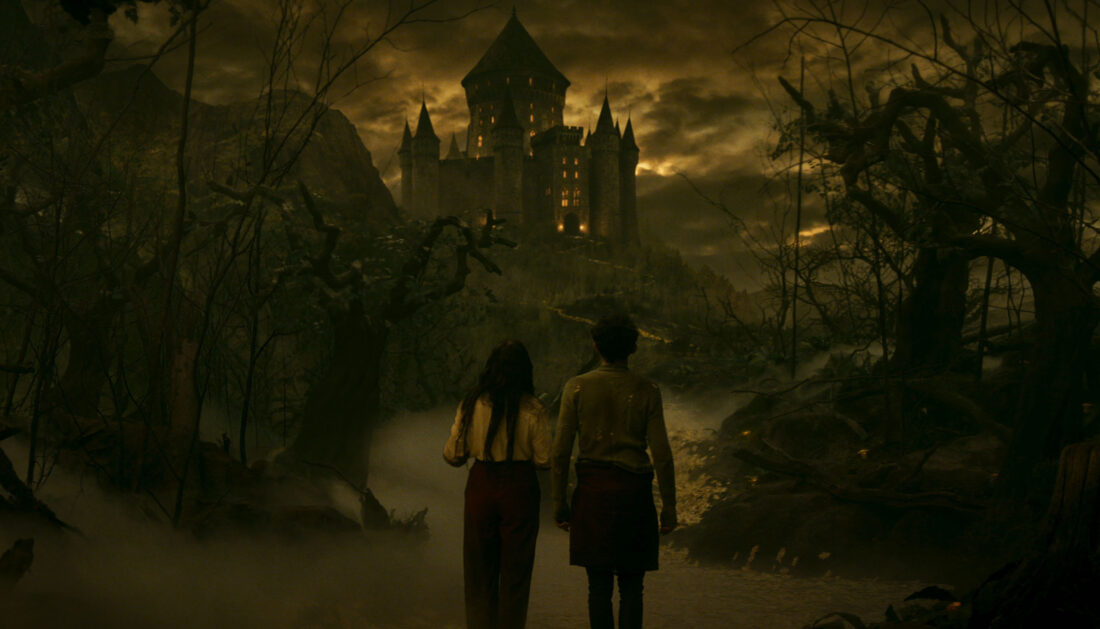
Lilia is in a Glinda costume and falling through an abyss. Then we’re back with Agatha and Billy, walking the Road. Agatha thinks that Billy decided to do this with her because she used to be his babysitter and his mom’s best friend. Billy insists that’s not the case; he already has a mother. There’s a large dour castle ahead, and Billy wonders aloud if Agatha has ever truly been on the Road. The two enter the castle together; Agatha is transformed to look like the Wicked Witch of the West, Billy like Maleficent. (Agatha insists that the Wicked Witch was based on her.) At the center of the room is a tarot reading table and the trial begins. Billy tries to read for Agatha, but he’s not very good at it—and when you pick the wrong card, a sword falls from the ceiling. One of Agatha’s cards indicates that she’s being truthful, but the swords are still falling.
Agatha takes up the deck and picks at random, laying down the cards and letting the swords fall on the theory that the room will run out eventually, but the ceiling begins to descend instead. Lilia and Jen are in a dirt tunnel following a path the Jen claims Lilia told them to follow. She has a lot of information that Lilia doesn’t remember, yet Jen insists that she learned all these things from Lilia. As they’re speaking, Lilia begins shifting through time and making the comments she made out of sequence earlier in the series. We see Lilia as a child (Chloe Camp), and then as she appears now, getting lessons on divination from her teacher (Laura Boccaletti) hundreds of years ago. Her teacher, or Maestra, encourages her to read tea leaves despite Lilia’s insistence that she’s bad at it. Back in the present, Jen asks Lilia to explain why she’s been acting this way, and Lilia tells her that the flow of time in an illusion and she experiences things out of sequence. The problem is worse than ever, though, and she wonders if it’s because she’s coming to the end.
Lilia flashes forward to being inside the castle with Billy and Agatha and Jen (she is dressed as Glinda and Jen is dressed as the White Queen disguised as the old woman). Lilia goes off on Billy, and he reads her mind to try and ease her anger. Jen takes her aside and insists that she’s not really mad at the kid anymore. Lilia tries to figure out the trial, and admits that she’s the one who cast the sigil on Billy to help buy him time to learn who he was. Then she’s flashing backward again and her mentor asks if she’s rooted in nature, if she’s practicing her craft, if she has a coven. Lilia says no to all these things, and then she’s back in the underground tunnel and finds Billy’s spell book. She admits to Jen that she stopped seeing through time as she aged because she ignored it; all she ever saw was death. They find the entrance to the next trial and emerge in their costumes—but this time Lilia tells Billy that they’re good.
Lilia begins the tarot reading, explaining how the cards work and in what order you call them. She begins doing a reading for Billy, telling him to ask a question: He asks if he’s Willian or Billy. She begins the reading, but the swords are still falling. She flashes back again to her mentor, who asks her why she won’t use her gifts and Lilia admits that she’s a forgotten woman, that her gifts don’t help; she saw the her entire coven would die of plague as a child and told them, but it didn’t change anything. Her mentor tells her that death comes for everyone, and Lilia wonders when it will come for her. Then she’s back with Jen at the start of their journey in the tunnel. They encounter the Salem Seven and avoid detection by them, but there’s also an exit off the Road that looks like a metro line. Lilia intends to keep following the tunnel and asks Jen to stay with her as her sister in the craft. Jen agrees and they start walking. Suddenly Lilia knows what she did wrong and she’s back in the tarot trial, realizing that she needs to do the reading for herself.
The reading tell her that her coven is what was missing; that Alice lies behind but Jen lies ahead; that a miraculous transformation is coming; she also remembers that she saw Rio in the tunnel and Rio is Death (the original Green Witch) and that Death is coming. The reading is over, the trial passed, and an Iron Maiden opens as an exit. Agatha confirms Rio’s identity, saying that she likes “bad boys.” They begin to leave now that the trial is complete. Lilia tells Agatha when “she” calls her a coward, to hit the deck. She gives Billy his spell book back and shoves Jen into the Iron Maiden, insisting that she is the future and closing the door. The Salem Seven emerge and Lilia inverts her Tower card from the reading, turning the room upside-down and impaling the Seven on the swords in the ceiling. She hangs on to the table as long as she can, but finally lets go and falls. We see young Lilia begin her lessons with her mentor.
Commentary
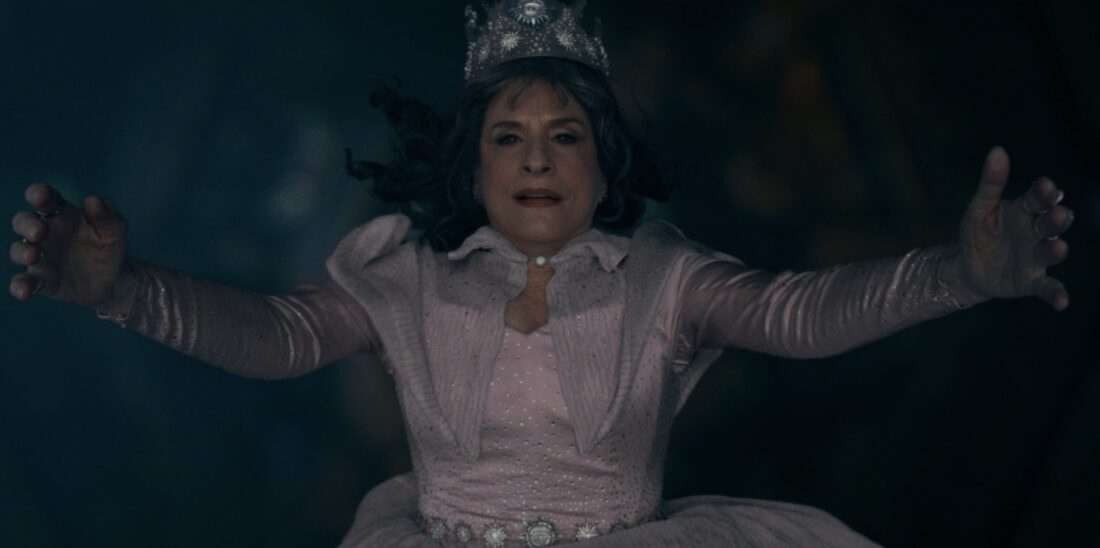
I knew Patti LuPone was gonna make me cry before this was over.
The episode manages to be a powerful illustration of the trials of aging that still steers clear of oversimplification. We have the aspect that, yes, Lilia’s ability does come off a great deal like dementia and other cognitive degenerative diseases. She’s aware of this, to the point of calling Jen out for thinking of her as a tottering old lady. Speculative fiction loves to use characters who are “unmoored” in time, but the extra layer of allegory here is devastating; Lilia wonders if the unmooring is getting worse because she’s getting closer to the end of her life, and it is, but that’s also how cognitive decline works. There are layers here.
But even having acknowledged that, we have Maestra, here because Lilia may be the oldest member of this coven, but we never stop being students in life. And more importantly, we often never let go of the negative views we have of ourselves: I was struck by how Lilia insists that she’s terrible as reading tea leaves hundreds of years after learning to do so. She never worked to get better at it over time—she decided she was bad at it, and held onto that belief hard, like a form of faith. She’s still holding it, even as her mentor speaks to her across eons and insists that she’s wrong.
Maestra also knows that many of Lilia’s problems are borne of fear, and some of that seems to be a fear of death, perhaps. Less so for herself than others, though, and that seems to be the key—what Lilia truly fears is something that she brought upon herself. Loneliness.
Lilia Calderu tried to warn the people she loved of their impending deaths, and it did nothing to save them. So her solution was to eschew that form of community for most of the rest of her life. And I love the choice of this arc, because there’s the question running through this entire series of who the coven is for, right? Not literally, but thematically. And the answer is all of them at different points, and perhaps we want it to be for Agatha a little so she can learn something big here. But really, it’s always been for Lilia. She assembled the names, for Dorothy’s sake. They’re her coven, the one that she needed to finally come full circle in her life.
That they let her go out on one last dramatic tarot reading (more tarot readings for dramatic effect, please) is gorgeous. That they flip the script and let Glinda the Good Witch do something heroic for a change is a direct answer to Lilia’s constant complaints against the Road for stereotyping them. (That entire trial was arranged to tweak at her with those costumes, and I do love that the Road is extremely petty that way?) That she dispatches the Salem Seven with her own unique abilities is such a power move. (Will it stick? Will any of this? Who can say, but for now, it’s a great time.)
And more like the Wizard of Oz than Glinda, she gives each member of her coven what they need. If any of them survive this, it’s all down to her. At the moment, I’m really hoping that this means great things are in store for Jen, but obviously Agatha and Billy will certainly get something out of this too. Billy did ask if was William or Billy (which I was so pleased to see them focus in on), and I’m guessing he does actually need his own trial…
Tarot Readings and Witchy Thoughts
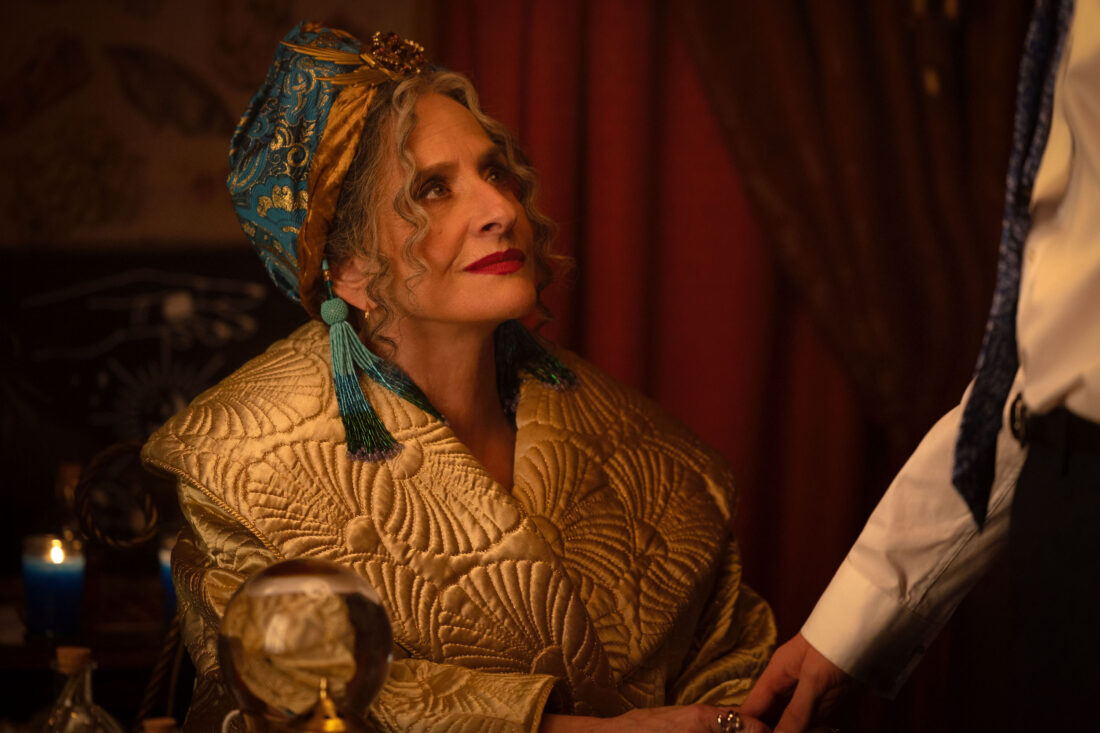
- This show retroactively makes WandaVision better because now we know it’s pretty likely that Agatha had a big ol’ crush on Wanda. (She said it herself; she likes powerful bad boys… when they’re girls. And also uses the term “ex-best-friend.”)
- Look, I know that some fans are predicting—as always—that Mephisto is waiting at the end of all this, or behind Rio’s work here somehow, and it’s gotten to the point where he’s been theorized as the mastermind so many times, that I kinda want the MCU to pull a House M.D. “it’s never lupus” and tease at the idea of Mephisto while never ever using him. I know that they won’t do this for me, but it would be so. damn. funny.
- I hope some little boys watching this show see Billy in that Maleficent costume and realize that all doors are open to them. Go be fabulous, kids.
- If Agatha is a basis for the Wicked Witch of the West, I really need to know how she met L. Frank Baum and what she did to piss him off. (Okay, maybe she meant the look for the film, but I want it to be the books.)
- Marvel characters being in love with Death is not unheard of; Deadpool is in love with her in the comics, and they have a sort of sun-and-moon thing going on account of… y’know, him never being able to reach her. Way more into Agatha and Rio, though, sorry.
Next week, a two-part finale! Not nervous at all.










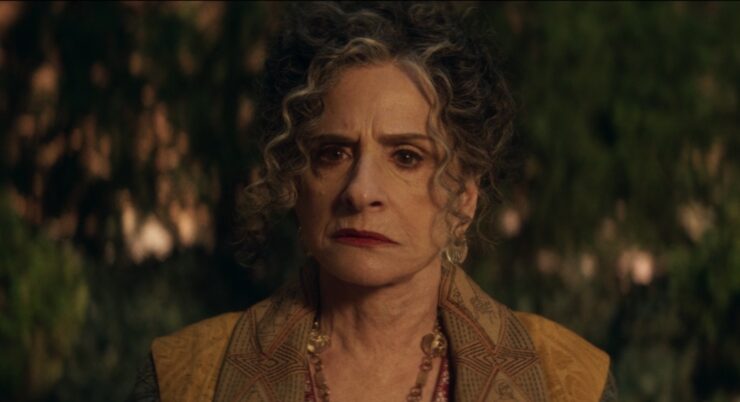

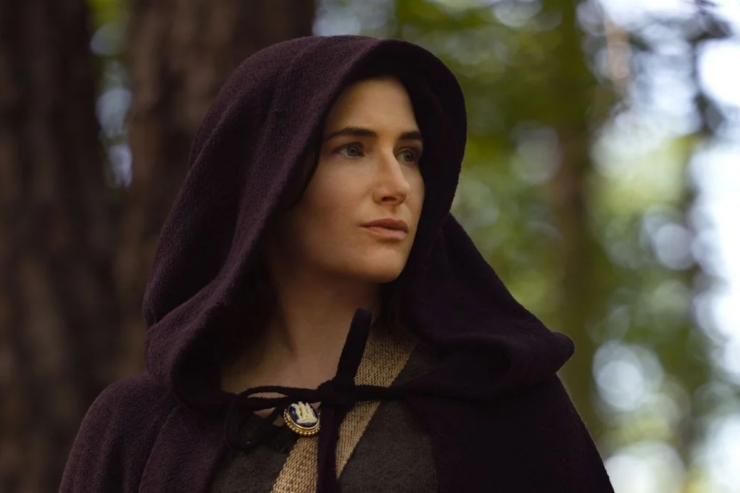
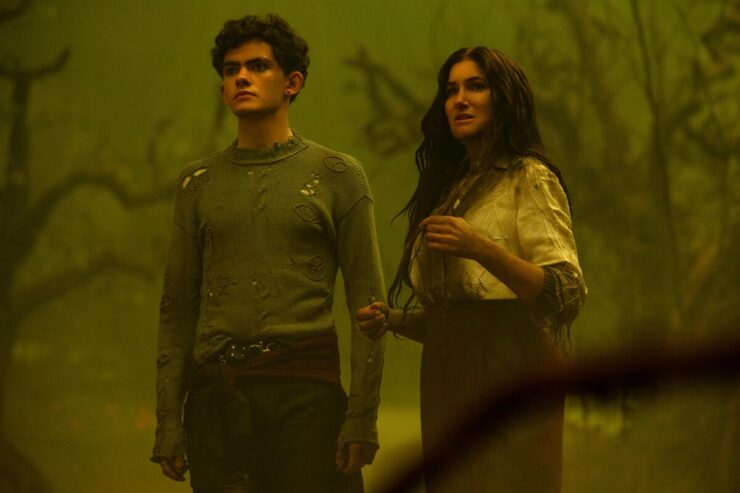
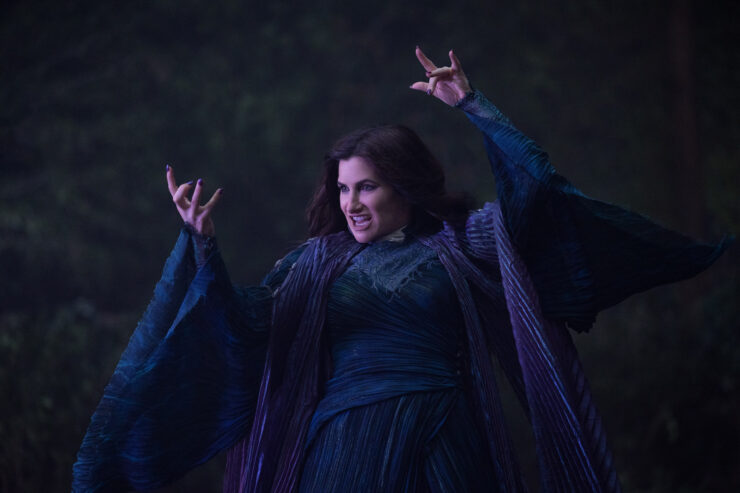
In the comics, Thanos was famously in love with female personification of Death for decades. That WAS his big motivation in the comics back in the day, although the movies chose to go another way. Indeed, the infamous “Snap” was originally intended to prove his love to Death, to win her affection by wiping out half of all living creatures.
I know that the idea of characters experiencing time out of order has precedent in myth, legend, and literature — T.H. White’s Merlin experienced time backward, and of course there was Billy Pilgrim in Slaughterhouse Five — but it occurred to me that this episode’s format is reminiscent of the movie Arrival (and the story it’s based on). As the most prominent recent example of the device, that may have been an influence on the episode.
I’m not crazy about an episode revolving around tarot, because Agatha is right — it’s all fabricated. It isn’t even ancient mythology — it was just a card game for centuries, until 18th-century occultists invented a bunch of fake history and mythology around the cards and started pretending they had divination powers. I guess the episode acknowledged that to an extent by saying it was “intuitive,” implying that it’s not that the cards themselves have power as that someone with power, like Lilia, can influence them or use them as a tool.
I’m still unsatisfied with the explanation for the sigil. Okay, so Lilia could see William’s future and knew he’d “need time,” but why exactly did that require Agatha and the viewers not knowing his identity? It still feels like an arbitrary plot device to create artificial mystery.
So now it’s confirmed that Rio is Death, which is interesting given that “Rio Vidal” means “River of Life.” But I guess you could say that the river of life carries us inexorably toward its end, which is pretty much the theme of this episode.
Hmm… I wonder if next week there will be a bit where Rio/Death mentions having once had to fend off the advances of an eager suitor called Thanos.
There is considerable disagreement within my immediate family on Arrival’s merits, but I really liked it. What sprang to mind for me first re Lilia’s jumbled time jaunts coming into linear focus, though, despite it being sort-of more like the “aha” retrospective at the end of The Sixth Sense (and other Shyamalan films), was the Bent-Neck Lady revelation in the 2018 adaptation of The Haunting of Hill House on Netflix, about which I won’t say anything more specific due to spoilers.
Okay, Slaughterhouse Five actually came to mind earlier, but that was prior to this episode.
Interesting to note that both Agatha and Teen’s costumed personas reflect characters that, theoretically villains, have been re-interpreted in recent retellings as protagonists. If Agatha’s statement that her power-leaching ability is not entirely under her control is taken as true, then the parallel becomes even more fraught, with both she and Elphaba being judged for aspects of their beings that are not their fault.
As for Lady Death’s relationship with Thanos, my favorite take on this was in a Peter David scripted issue of The Hulk, in which about 2/3rds of the Marvel Universe showed up for Rick Jones’ wedding. (Never let The Impossible Man deliver your invites, folks!) She makes a brief cameo (amusingly drawn from behind as if she were the DC Comics Death of the Endless), gives the bride a wedding present (a brush, heh!), and notes that she has to leave quickly before that creepy stalker, Thanos shows up…
Interesting that, between The Sandman and this, both of the major comics companies’ female personifications of Death have been depicted in live-action streaming television within slightly over two years of each other.
This was the best episode yet. I just knew they weren’t going to toss Patti LuPone into a mud puddle and forget her. The story was like an unfolding puzzle that made perfect sense in the end. And Patti got to go out with a great curtain call as a badass hero.
Absolutely enjoying this show, and loved this episode. Since it was an older, happier version of young Lilia in the final scene, and with kind of warm lighting, I was wondering whether she had joined her mentor in an afterlife.
Another Marvel woman falling to her death :sigh:
I’m tired of characters being revealed to have interesting stories, only to die, with most of their backgrounds unexplored.
Then again, I don’t like the idea that a story has no stakes if death is not on the line.
Whereas I don’t like the idea that life and death are the only meaningful stakes in a story, as if it were just a scorecard. Stakes aren’t just about who comes out alive at the end, they’re about how people are changed. I think death is too often used as a blunt-force story device, a lazy fallback in lieu of something more creative. (And I’m not excluding myself from that. I’m dissatisfied that in my first original novel, I killed off all three of the protagonist’s mentor/father figures, including her actual father.)
That’s what I meant. :)
Oh, sorry. I misread your last sentence.
No worries!
I remember Rothfuss being asked about killing characters on a panel and basically responding along the lines of “you think killing my characters is the worst thing I can do to them?”
Let’s remember that Rio’s parting words early on, bordering on catchphrase status if not too infrequent to qualify, were “Te veo” — literally “I see you” but colloquially “I’ll be seeing you,” very apt for Death.
I’ve always had my own issues watching stories that are told out of sequence, reflecting a character’s fractured state of mind, or time-skipping in a non-linear fashion and whatnot. It’s a credit to this show that Lilia’s journey of self-reflection and ultimate sacrifice make the non-linear aspect of the episode so damn watchable and riveting that you just go with the non-linear and never find yourself questioning the motive for each time jump. There is a poignant tragic character’s story unfolding after all. And of course, it happens to be episode 7 – the low point of the entire story.
That final shot of her flipping the entire room and putting an end to the Seven is a visual feast. I’m even more surprised it took Marvel this long to give the writers the autonomy to realize their vision (remembering that previous MCU/Disney+ offerings had the showrunner playing second banana to the director for “reasons”). Schaeffer knows what she’s doing. Marvel has always tried making these shows as long-form movies, but Schaffer the writer understands the need for it to also be pure television – character first.
This is the first episode of this series that truly got me interested, mainly because it properly focuses on one character and gives them a truly meaningful motivation for choosing the Road, even if it wasn’t the motivation they told themselves at the time. (And obviously because Patti LuPone acts her heart out, but that is a given)
Yes, the other witches had their own personal trials, but I don’t feel like I know Jen or Alice or even Agatha better after those. And poor Sharon didn’t even get to do her own thing, despite being the most interesting of the bunch while not even being an actual witch.
Which brings me to the thing that bugs me most about this series and Marvel TV in general: it’s too short, and wastes so much time every episode running in circles despite being so short. This needed to be at least a full season, maybe more, and give more time and focus to all of the characters before killing them off. Even if they come back to life for the ending (because this is Marvel, so it’s never off the books regardless of what the creators say) there really isn’t enough time left to get into introspective mode for any of them.
Btw, Maestra is just the female form of the Italian word for teacher, so it should be “the Maestra” in the article (like “the Doctor” or “the Master”); you only use it as a noun if you’re addressing them directly.